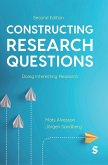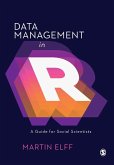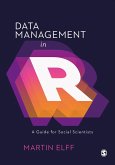Janet Salmons
Doing Qualitative Research Online
Janet Salmons
Doing Qualitative Research Online
- Gebundenes Buch
- Merkliste
- Auf die Merkliste
- Bewerten Bewerten
- Teilen
- Produkt teilen
- Produkterinnerung
- Produkterinnerung
New to online qualitative research? This book equips you with the skills to make good research choices so you can confidently conduct a project using internet methods.
Andere Kunden interessierten sich auch für
![Constructing Grounded Theory (Third Edition) Constructing Grounded Theory (Third Edition)]() Kathy CharmazConstructing Grounded Theory (Third Edition)172,99 €
Kathy CharmazConstructing Grounded Theory (Third Edition)172,99 €![Constructing Research Questions Constructing Research Questions]() Mats AlvessonConstructing Research Questions145,99 €
Mats AlvessonConstructing Research Questions145,99 €![Analyzing Social Networks Analyzing Social Networks]() Stephen P BorgattiAnalyzing Social Networks128,99 €
Stephen P BorgattiAnalyzing Social Networks128,99 €![Data Management in R Data Management in R]() Martin ElffData Management in R39,99 €
Martin ElffData Management in R39,99 €![Data Management in R Data Management in R]() Martin ElffData Management in R110,99 €
Martin ElffData Management in R110,99 €![Analyzing Social Networks Analyzing Social Networks]() Stephen P BorgattiAnalyzing Social Networks40,99 €
Stephen P BorgattiAnalyzing Social Networks40,99 €![Case Study Research and Applications Case Study Research and Applications]() Robert K. YinCase Study Research and Applications82,99 €
Robert K. YinCase Study Research and Applications82,99 €-
-
-
New to online qualitative research? This book equips you with the skills to make good research choices so you can confidently conduct a project using internet methods.
Hinweis: Dieser Artikel kann nur an eine deutsche Lieferadresse ausgeliefert werden.
Hinweis: Dieser Artikel kann nur an eine deutsche Lieferadresse ausgeliefert werden.
Produktdetails
- Produktdetails
- Verlag: SAGE Publications Ltd
- Seitenzahl: 384
- Erscheinungstermin: 24. Dezember 2021
- Englisch
- Abmessung: 250mm x 175mm x 25mm
- Gewicht: 840g
- ISBN-13: 9781529714135
- ISBN-10: 1529714133
- Artikelnr.: 62272226
- Herstellerkennzeichnung
- Libri GmbH
- Europaallee 1
- 36244 Bad Hersfeld
- gpsr@libri.de
- Verlag: SAGE Publications Ltd
- Seitenzahl: 384
- Erscheinungstermin: 24. Dezember 2021
- Englisch
- Abmessung: 250mm x 175mm x 25mm
- Gewicht: 840g
- ISBN-13: 9781529714135
- ISBN-10: 1529714133
- Artikelnr.: 62272226
- Herstellerkennzeichnung
- Libri GmbH
- Europaallee 1
- 36244 Bad Hersfeld
- gpsr@libri.de
Dr. Janet Salmons is a qualitative scholar and methodologist. She is a Fellow at the Center for Advanced Internet Studies and edits the newsletter, "When the Field is Online". Recent books include: Doing Qualitative Research Online 2nd edition (2022), What Kind of Researcher Are You? (2021), Reframing and Rethinking Collaboration in Higher Education and Beyond: A Practical Guide for Doctoral Students and Early Career Researchers with Narelle Lemon (2021), Publishing from your Doctoral Research: Create and Use a Publication Strategy with Helen Kara (2020), Learning to Collaborate, Collaborating to Learn (2019), Find the Theory in Your Research (2019), and Getting Data Online (2019). She previously managed the Sage Research Methods Community (formerly known as Methodspace). Dr. Salmons received a B.S. in Adult and Community Education from Cornell University, an M.A. in Social Policy Studies from the SUNY Empire State College, and a Ph.D. in Interdisciplinary Studies and Educational Leadership at the Union Institute & University. She lives and works in Boulder, Colorado. Website link: www.salmons.blog
Chapter 1: Using Qualitative Approaches for Research in a Data-Intensive
World
Part I: Designing Online Qualitative Studies
Chapter 2: Choosing Methodologies and Methods for Online Studies
Chapter 3: Choosing Information and Communications Technologies for Online
Studies
Part II: Becoming an Ethical Online Researcher
Chapter 4: Designing an Ethical Online Study
Chapter 5: Conducting an Ethical Online Study
Chapter 6: Researchers' Roles and Positions
Part III: Preparing to Collect Data Online
Chapter 7: Creating a Sampling Plan
Chapter 8: Recruiting, Finding, and Selecting Participants Online
Chapter 9: Preparing to Interact with Participants Online
Part IV: Collecting Qualitative Data Online
Chapter 10: Finding and Collecting Extant Data Online: Using Posts,
Archives, or Big Data
Chapter 11: Eliciting Data Online: Asking Participants about Their
Experiences
Chapter 12: Using Enacted Methods Online: Generating Data with Creative and
Experiential Methods
Part V: Working with Data and Reporting Findings
Chapter 13: Organizing, Analyzing, and Interpreting Data
Chapter 14: Writing, Reporting, Presenting, and Contributing to the
Literature
Chapter 15: Online Communications and Online Qualitative Research: Trends
and Influences
World
Part I: Designing Online Qualitative Studies
Chapter 2: Choosing Methodologies and Methods for Online Studies
Chapter 3: Choosing Information and Communications Technologies for Online
Studies
Part II: Becoming an Ethical Online Researcher
Chapter 4: Designing an Ethical Online Study
Chapter 5: Conducting an Ethical Online Study
Chapter 6: Researchers' Roles and Positions
Part III: Preparing to Collect Data Online
Chapter 7: Creating a Sampling Plan
Chapter 8: Recruiting, Finding, and Selecting Participants Online
Chapter 9: Preparing to Interact with Participants Online
Part IV: Collecting Qualitative Data Online
Chapter 10: Finding and Collecting Extant Data Online: Using Posts,
Archives, or Big Data
Chapter 11: Eliciting Data Online: Asking Participants about Their
Experiences
Chapter 12: Using Enacted Methods Online: Generating Data with Creative and
Experiential Methods
Part V: Working with Data and Reporting Findings
Chapter 13: Organizing, Analyzing, and Interpreting Data
Chapter 14: Writing, Reporting, Presenting, and Contributing to the
Literature
Chapter 15: Online Communications and Online Qualitative Research: Trends
and Influences
Chapter 1: Using Qualitative Approaches for Research in a Data-Intensive World
Part I: Designing Online Qualitative Studies
Chapter 2: Choosing Methodologies and Methods for Online Studies
Chapter 3: Choosing Information and Communications Technologies for Online Studies
Part II: Becoming an Ethical Online Researcher
Chapter 4: Designing an Ethical Online Study
Chapter 5: Conducting an Ethical Online Study
Chapter 6: Researchers' Roles and Positions
Part III: Preparing to Collect Data Online
Chapter 7: Creating a Sampling Plan
Chapter 8: Recruiting, Finding, and Selecting Participants Online
Chapter 9: Preparing to Interact with Participants Online
Part IV: Collecting Qualitative Data Online
Chapter 10: Finding and Collecting Extant Data Online: Using Posts, Archives, or Big Data
Chapter 11: Eliciting Data Online: Asking Participants about Their Experiences
Chapter 12: Using Enacted Methods Online: Generating Data with Creative and Experiential Methods
Part V: Working with Data and Reporting Findings
Chapter 13: Organizing, Analyzing, and Interpreting Data
Chapter 14: Writing, Reporting, Presenting, and Contributing to the Literature
Chapter 15: Online Communications and Online Qualitative Research: Trends and Influences
Part I: Designing Online Qualitative Studies
Chapter 2: Choosing Methodologies and Methods for Online Studies
Chapter 3: Choosing Information and Communications Technologies for Online Studies
Part II: Becoming an Ethical Online Researcher
Chapter 4: Designing an Ethical Online Study
Chapter 5: Conducting an Ethical Online Study
Chapter 6: Researchers' Roles and Positions
Part III: Preparing to Collect Data Online
Chapter 7: Creating a Sampling Plan
Chapter 8: Recruiting, Finding, and Selecting Participants Online
Chapter 9: Preparing to Interact with Participants Online
Part IV: Collecting Qualitative Data Online
Chapter 10: Finding and Collecting Extant Data Online: Using Posts, Archives, or Big Data
Chapter 11: Eliciting Data Online: Asking Participants about Their Experiences
Chapter 12: Using Enacted Methods Online: Generating Data with Creative and Experiential Methods
Part V: Working with Data and Reporting Findings
Chapter 13: Organizing, Analyzing, and Interpreting Data
Chapter 14: Writing, Reporting, Presenting, and Contributing to the Literature
Chapter 15: Online Communications and Online Qualitative Research: Trends and Influences
Chapter 1: Using Qualitative Approaches for Research in a Data-Intensive
World
Part I: Designing Online Qualitative Studies
Chapter 2: Choosing Methodologies and Methods for Online Studies
Chapter 3: Choosing Information and Communications Technologies for Online
Studies
Part II: Becoming an Ethical Online Researcher
Chapter 4: Designing an Ethical Online Study
Chapter 5: Conducting an Ethical Online Study
Chapter 6: Researchers' Roles and Positions
Part III: Preparing to Collect Data Online
Chapter 7: Creating a Sampling Plan
Chapter 8: Recruiting, Finding, and Selecting Participants Online
Chapter 9: Preparing to Interact with Participants Online
Part IV: Collecting Qualitative Data Online
Chapter 10: Finding and Collecting Extant Data Online: Using Posts,
Archives, or Big Data
Chapter 11: Eliciting Data Online: Asking Participants about Their
Experiences
Chapter 12: Using Enacted Methods Online: Generating Data with Creative and
Experiential Methods
Part V: Working with Data and Reporting Findings
Chapter 13: Organizing, Analyzing, and Interpreting Data
Chapter 14: Writing, Reporting, Presenting, and Contributing to the
Literature
Chapter 15: Online Communications and Online Qualitative Research: Trends
and Influences
World
Part I: Designing Online Qualitative Studies
Chapter 2: Choosing Methodologies and Methods for Online Studies
Chapter 3: Choosing Information and Communications Technologies for Online
Studies
Part II: Becoming an Ethical Online Researcher
Chapter 4: Designing an Ethical Online Study
Chapter 5: Conducting an Ethical Online Study
Chapter 6: Researchers' Roles and Positions
Part III: Preparing to Collect Data Online
Chapter 7: Creating a Sampling Plan
Chapter 8: Recruiting, Finding, and Selecting Participants Online
Chapter 9: Preparing to Interact with Participants Online
Part IV: Collecting Qualitative Data Online
Chapter 10: Finding and Collecting Extant Data Online: Using Posts,
Archives, or Big Data
Chapter 11: Eliciting Data Online: Asking Participants about Their
Experiences
Chapter 12: Using Enacted Methods Online: Generating Data with Creative and
Experiential Methods
Part V: Working with Data and Reporting Findings
Chapter 13: Organizing, Analyzing, and Interpreting Data
Chapter 14: Writing, Reporting, Presenting, and Contributing to the
Literature
Chapter 15: Online Communications and Online Qualitative Research: Trends
and Influences
Chapter 1: Using Qualitative Approaches for Research in a Data-Intensive World
Part I: Designing Online Qualitative Studies
Chapter 2: Choosing Methodologies and Methods for Online Studies
Chapter 3: Choosing Information and Communications Technologies for Online Studies
Part II: Becoming an Ethical Online Researcher
Chapter 4: Designing an Ethical Online Study
Chapter 5: Conducting an Ethical Online Study
Chapter 6: Researchers' Roles and Positions
Part III: Preparing to Collect Data Online
Chapter 7: Creating a Sampling Plan
Chapter 8: Recruiting, Finding, and Selecting Participants Online
Chapter 9: Preparing to Interact with Participants Online
Part IV: Collecting Qualitative Data Online
Chapter 10: Finding and Collecting Extant Data Online: Using Posts, Archives, or Big Data
Chapter 11: Eliciting Data Online: Asking Participants about Their Experiences
Chapter 12: Using Enacted Methods Online: Generating Data with Creative and Experiential Methods
Part V: Working with Data and Reporting Findings
Chapter 13: Organizing, Analyzing, and Interpreting Data
Chapter 14: Writing, Reporting, Presenting, and Contributing to the Literature
Chapter 15: Online Communications and Online Qualitative Research: Trends and Influences
Part I: Designing Online Qualitative Studies
Chapter 2: Choosing Methodologies and Methods for Online Studies
Chapter 3: Choosing Information and Communications Technologies for Online Studies
Part II: Becoming an Ethical Online Researcher
Chapter 4: Designing an Ethical Online Study
Chapter 5: Conducting an Ethical Online Study
Chapter 6: Researchers' Roles and Positions
Part III: Preparing to Collect Data Online
Chapter 7: Creating a Sampling Plan
Chapter 8: Recruiting, Finding, and Selecting Participants Online
Chapter 9: Preparing to Interact with Participants Online
Part IV: Collecting Qualitative Data Online
Chapter 10: Finding and Collecting Extant Data Online: Using Posts, Archives, or Big Data
Chapter 11: Eliciting Data Online: Asking Participants about Their Experiences
Chapter 12: Using Enacted Methods Online: Generating Data with Creative and Experiential Methods
Part V: Working with Data and Reporting Findings
Chapter 13: Organizing, Analyzing, and Interpreting Data
Chapter 14: Writing, Reporting, Presenting, and Contributing to the Literature
Chapter 15: Online Communications and Online Qualitative Research: Trends and Influences








